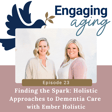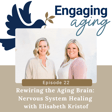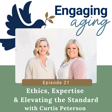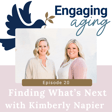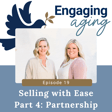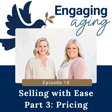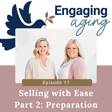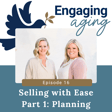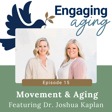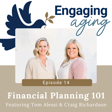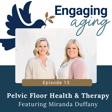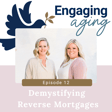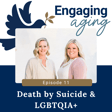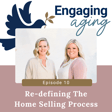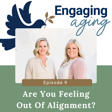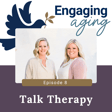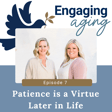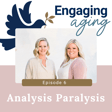Become a Creator today!Start creating today - Share your story with the world!
Start for free
00:00:00
00:00:01

Plant Medicine & Aging: Exploring Microdosing, Healing, & Hope with Setas Seminary
In this thought-provoking episode of Engaging Aging, Erin and Lauren open up a powerful conversation about the emerging role of plant medicine in supporting mental health, cognitive health, and overall well-being—especially for older adults. Joined by Reverend Dr. Leah Linder and Reverend Pam Convoy, experts in plant medicine and therapeutic integration, we explore:
- What plant medicine really is (hint: you may already be using it daily!)
- How psilocybin microdosing is showing promise for anxiety, depression, PTSD, Parkinson’s, Alzheimer’s, and more
- The importance of addressing root causes, not just symptoms, in aging and mental health
- Real client success stories, from renewed creativity and calmer moods to improved focus and reduced pain
- Why quality, safety, and integration practices matter when considering plant medicine
This episode shines a light on both the science and the spirituality of these ancient practices, while breaking down stigma and misconceptions. Whether you’re an older adult, a caregiver, or simply curious, you’ll walk away with new insights into how plant medicine may become part of the future of aging well.
You can learn more at https://www.setasseminary.org
Transcript
Introduction to Engaging Aging and Plant Medicine
00:00:00
Speaker
Welcome to Engaging Aging. I'm Erin DiCarlo. And I'm Lauren Watts. We believe life gets richer with age, and we're here to prove it. We bring you real conversations about aging well, living fully, and navigating this journey with confidence.
00:00:15
Speaker
So let's dive in, because aging isn't something to endure, it's something to embrace.
00:00:23
Speaker
Welcome everyone. We're so excited to bring this really unique topic. It's a topic that we have not talked about before. um And we talk a lot about a lot of different things.
Understanding Plant Medicine and Guest Introductions
00:00:34
Speaker
um Lauren and I have been on our own journeys over the last few years, opening up, as many of you have heard, to different modalities, healing experiences, And something that came across our desk a few months ago was something called plant medicine.
00:00:50
Speaker
And when we heard about the healing benefits and qualities for older adults, we were really intrigued. And so what we typically do when we're unfamiliar with something is we do a full swan dive into it.
00:01:03
Speaker
to learn all the beautiful things. And we're super excited to bring this topic um to you. So if the word plant medicine sounds a little scary or unknown to you, don't worry. Most of you are actually participating with plant medicine every day and you don't even know it from maybe the herbal supplements you take to the coffee and tea that you drink to the food that you eat. And so um you're swimming in the waters and may not even know already.
00:01:33
Speaker
So we're thrilled to dive in today. What we do wanna say as a disclaimer is we are not medical professionals. We're not here to diagnose or treat, but we are here to share some fascinating science and information with all of you.
Leah Linder on Mental Health and Plant Medicine
00:01:48
Speaker
So without further ado, welcome Reverend Leah Linder and Pam Convoy to the conversation. Erin and I, as Erin just mentioned, have been ingrained in a lot of different conversations with both of you. And we are so excited to finally have you on the podcast to be talking about all things. Both of you are experts in plant medicine and therapeutic and integration.
00:02:14
Speaker
um So I'd love for both of you just to kind of start a little bit about your background and how you came into this space and the magic that you're creating together to be able to share with our audience and audiences alike aye moving forward.
00:02:30
Speaker
Yeah, absolutely. um i can say it's a true joy. Thank you kindly for having us on your podcast. it's something that I feel so remarkably passionate about.
00:02:40
Speaker
I have been in the medical field. I'm a naturopathic physician, but also worked in the Western medical field. um So collectively around 20 years or so. And so ah being a naturopathic physician, um ah root cause medicine is my dearest passion.
00:02:58
Speaker
of finding what is actually going on at the base level. And we address that because we're each our own unique individuals and treating the whole person is really important. And I think that mental health very often is a taboo, um is something that we don't talk about. You know, if you break your arm,
Pam Convoy and the Church's Mission
00:03:18
Speaker
You can obviously see something's going wrong. People ask you about it. But mental health is one of those things that sits in the background. And we don't have a lot of space in our culture to actually talk about that or even potentially a lot of people that we can talk to about it.
00:03:33
Speaker
um And there's a stigma around not being mentally strong. And so the way that this all came about, um it actually came to me. So I have, ah you know, a wide variety of patients in my naturopathic practice.
00:03:51
Speaker
that are very high functioning individuals, people from architects to business owners to yeah docs ah to nurse practitioners and the whole gamut.
00:04:04
Speaker
And at one week I had three different patients come to me and say, oh, you know, I've listened to this podcast or i watched this documentary or i you know, read this article.
00:04:16
Speaker
And I really want like introduce microdosing. Like, what do you think about it? And, you know, in my ignorance at that time, I had only witnessed plant medicine, specifically psilocybin, being more in that recreational um realm.
00:04:31
Speaker
And so I said, OK, let's pause. Let me do some research and see if there is some potential that I can stand behind as a physician. And the research was there.
00:04:42
Speaker
um There is heaps of research as far as supporting various mental health conditions from treatment resistant depression to anxiety and
Challenges and Benefits of Plant Medicine for Older Adults
00:04:54
Speaker
PTSD and alcohol addiction. And it it really surprised me about the depth and breadth of research that was out there.
00:05:03
Speaker
And that so it was one of those things that I was like, OK, let' let's go ahead and give it a try. And it was a profound catalyst of change for my patients. So they had all the baseline you know, naturopathic practices on board, we were addressing sleep and diet and ah interpersonal relationships and nutrition and, you know, all of those really yummy things.
00:05:28
Speaker
And this was the one thing that really flipped the switch um in such a profound way for people. And so I was, Pam and I used to work together at a professional supplement company.
00:05:42
Speaker
And we hadn't seen each other in a while. And we're out having lunch together. And I was telling her about this. And I was like, gosh, it kind of feels like it needs to be in the water because it has such a strong safety profile of any other psychoactive substance, including alcohol, including nicotine.
00:05:59
Speaker
um And, you know, there's, you know, these things. you know, the US FDA even, you know, classified in 2018 and 2019 and designated psilocybin as breakthrough therapy for the treatment of PTSD and depression.
00:06:15
Speaker
And that really opened up the space for these clinical studies. And I was like, was so excited chatting with her about it. um And then ah Pam's beautiful entrepreneurial brain just clicked on. So i'll let her open up to where it went from there.
00:06:32
Speaker
Yeah, thanks, Leah, and thank you, both Erin and Lauren. It's a real pleasure to talk about this. There's a lot of passion behind this project. um So as Leah mentioned, we work together. My background is in biology. I was a clinical laboratorian by training, um but spent most of my life in marketing in the medical space, ah from conventional medicine to animal health to nutritional supplements.
00:06:56
Speaker
So when Leo was explaining this to me, I'm thinking, wow, I didn't even realize we were in the middle of a renaissance. You know, virtually every academic institution worth its salt here in the U.S. has a psychedelic laboratory.
00:07:10
Speaker
um There's ah been a tremendous amount of research on both macro versions, so we can talk about the differences between macro and micro. But micro is sub perceptual. So you don't have a psychedelic experience macro being perceptual, you definitely have a psychedelic experience. So as Lisa, li as Lisa, as Leah was mentioning.
00:07:33
Speaker
um There are has been just a profound amount of information on mental health, as well as cognitive health and things like Parkinson's disease, Alzheimer's disease, because of the the um functional mechanisms of these mushrooms, which I think we're going to dive into, but I'll skip over that for the time being.
00:07:53
Speaker
um So I knew that there were ayahuasca churches here in
Integration and Support in Plant Medicine Practices
00:07:57
Speaker
the US um opening, ah you know, operating pretty openly. So i'm thinking there has to be something with the church kind of structure that allows for the use of these entheogenic plant medicines.
00:08:10
Speaker
So it actually turns out that in 1993, the federal government, so this is a federal legislation, um passed a law called the Religious Freedom Restoration Act. And this was specifically for indigenous peoples that for hundreds and thousands of years have been using these mind altering plant medicines for spiritual practice.
00:08:32
Speaker
So the legislation itself talks about when entheogens, these types of plant medicines are being used in sincere spiritual practice not defining what the medicine is and not defining what the practice is just that it's a sincere practice that's protected use so this doesn't affect legalization each state and municipality has their own attitudes about this and there's a lot of progress in the u.s right now um finding a legal path and or a medical pathway to use psilocybin in these ways.
00:09:08
Speaker
um But as a church, we actually have a protected use clause in that, again, it's nationwide. So um I built a church.
00:09:19
Speaker
We are a 5013C religious organization. We behave as a church because that sincere use clause is very important. um So a lot of our education or kind of sermon um sermon practices are around naturopathic medicine.
00:09:37
Speaker
and whole wellness. So it's not just all about the mushrooms themselves, but also your diet, your lifestyle, how much sunshine you get, how much exercise you get, the health of your relationships, you know, grounding with the earth.
00:09:53
Speaker
Hot and cold therapy. There are a million tools to help center people and bring them to a higher level of wellness. And we see it as our obligation to ah expose all of these different tools. And then each individual sort of builds their own toolbox.
00:10:10
Speaker
I love that. There's two things. Sorry to chime in here. Two things you both mentioned that are at the core of what we see for challenges with our older or adult clients. One, unaddressed mental health, maybe challenges or concerns. This is definitely a population that was raised without conversation or discussion around mental health support or needs.
00:10:31
Speaker
And then just the limited access to I hate to use the word geriatric, but like geriatric specific providers is extremely limited. And most resources are hard to um maybe technologically tap into if it's like virtual visits and whatnot.
00:10:48
Speaker
um But the second is the treatment of just symptoms. So Leah, you hit on that a few minutes ago. Like so many people are seeing traditional medicine doctors for treatment of symptoms, but no one's looking at that holistic person, like you just said, connecting with nature and sun and interpersonal relationships and what is the health um you know, hydration and nutrition. And I think that's such an important component for us to talk a little bit about that. That is the practice in which you recommend to people is this isn't just this like magic plant medicine. There's, you're looking at the whole person and helping them create that toolbox, so to say.
00:11:29
Speaker
um So tell us a little bit more about that work that you do. And we know, and we're going to talk today about you do have older adult clients and you are seeing amazing success stories. So it's helpful for, I think our listeners to understand when someone starts to work with you, how do you dabble into this space with them?
00:11:49
Speaker
You
Psilocybin's Impact on Cognitive Function and Mood
00:11:50
Speaker
know, that's a really good question. And I think that it takes a whole care team, right, to witness whether or not this is going to be something beneficial for the individual.
00:12:00
Speaker
And i think that just like you were saying, Aaron, is that, excuse me, Lauren, that, not Aaron, sorry. Yeah. Your brain is like, oh, I got this man.
00:12:13
Speaker
That, you know, real root cause medicine is addressing the systems, not the symptoms. And that takes a whole team. So very often it is the family members that are witnessing that, you know, they're, you know,
00:12:31
Speaker
their elder adult is our elder parent is needing some cognitive support that they're starting to see their mind shift. um A lot of times there is mood dysregulation that happens as well.
00:12:44
Speaker
um There's pain and there's inflammation that's on board, you know, that maybe isn't necessarily being addressed at that root cause. Sleep is another huge issue for these individuals too.
00:12:56
Speaker
um You know, and then opening into like that you're not like yes, maybe you're getting older, but that you're not necessarily at the end of your ability to have creativity, have fun, have joy, have play, um you know, and so, ah and addressing that quality of life and that, you know, that existential wellbeing, I think is really important. And then also being social,
00:13:25
Speaker
Like those are the things that we see so often in the individuals that we participate in, these elder adults that have cognitive challenges, is that that that there is that hiccup of wanting to engage. What if somebody is going to judge me? What if they're going to do this? So um from a psilocybin perspective, and maybe I'm not answering your question, but i can talk a little bit about how psilocybin can affect those different. Yeah, I think that'd be helpful.
00:13:52
Speaker
Okay, so um it's kind of starting from the top. So from a cognitive support, ah psilocybin is able to target what's called the 5-HT2A serotonin receptor most prominently. And this is in our prefrontal cortex. So this is all about our judgment, all about our self-perception, how we engage in language, how we engage with other individuals, how we read the room, if you will, and figure out how um but we can contribute to that.
00:14:23
Speaker
And so psilocybin is able to enhance what's called neuroplasticity and neurogenesis. So it, by targeting those receptors, it basically ignites different parts of the brain to grow new neural pathways.
00:14:38
Speaker
And as we go through cognitive changes, as we get older, um but finding different ways to do the same thing can be a really beneficial thing. because maybe it's not because our brains are habitual organs. They love doing the same thing all the time. And if those patterns start to get hiccuped, then there's a huge amount of frustration of like, I know what I need to do. I know that I've done this before, but I i don't, I can't figure that out the same way that I've done it by creating this neuroplasticity. It's like, Ooh, let's find a new neural pathway.
00:15:11
Speaker
Let's grow new what's called dendrites, new nerve endings to come to the same conclusion. And the other part of that is that it creates synaptic plasticity. So what was a normal pathway that we've traveled down many, many, many, many times, now we can find a different route around. It's kind of like when we use our GPS system that it routes us around the heavy congested traffic.
00:15:37
Speaker
So that's really, really important. And um there are some studies that demonstrate that it supports memory. It it supports those executive functions such as interpersonal skills, high level thinking, and then also ah attention, especially in aging brains too, because sometimes we get a little bit more distracted.
00:15:59
Speaker
And so like keeping that attention, keeping that focus, I think can be really beneficial. ah Coming down the list, the next one is mood regulation. And you guys are feel free to pause me because I keep going. It's fine. yeah we're in on on all the sets yeah Mood regulation is a huge part of it. So um ah it's seen that low doses of psilocybin can, again, stimulate those serotonin pathways, which is all about depression and anxiety.
00:16:28
Speaker
um Both in younger individuals and older individuals. So it can enhance that emotional resilience and reduce the rumination, the rigid thinking patterns, which is so common in people when there are a bunch of life changes happening at that elder stage as well.
00:16:47
Speaker
And then pain and inflammation modulation. So psilocybin is a potent anti-inflammatory, especially in the brain. And so this can help not only with chronic pain issues, but also age-related inflammation. And because it also is able to alter pain perception and the emotional response to chronic pain.
00:17:06
Speaker
So like arthritis and neuropathy, oh, this is something that is just um because when we're in pain, like it's hard to step outside of that. And so psilocybin has the ability to shift that perception of, oh, maybe this is just something that I can now manage versus, oh, this is just what I have to deal with And like a belief rewire, right? So when ah when we have those new connections, new neural pathways, like you know maybe a little bit less pain, we're able to approach life with maybe a different, like you said, mindset over time. do you Is this over long-term use? I know there's been so many studies and we will, by the way, everyone have links in the show notes to some of these um scientific journals and articles, as well as Pam mentioned the...
00:17:54
Speaker
ah Most universities have clinical trials going on um But is the ah is it usually over long-term use or do people notice changes pretty quickly? So
Shifting Attitudes Towards Plant Medicine
00:18:06
Speaker
it depends on the individual. um a lot of the clinical research is done on either single macro dose journeys.
00:18:15
Speaker
um There are very few on actual micro dosing, even though they work through the same chemical pathways and the same benefits. But I would say that you know, most individuals, especially elder individuals, they might not necessarily notice the significant changes that are happening, but their caregivers will. They're is that there's more peace in the home. They'll notice that they're not so defiant. They'll notice that maybe they have more of an appetite or want to engage more in social activities.
00:18:50
Speaker
And so that's the thing with microdosing is that it is sub perceptual. So it's that lower dose and it works in that background. And so um but what we see very often with individuals with cognitive challenges, cognitive decline,
00:19:05
Speaker
is that within about a month or so that the caregivers are saying like, whoa, what has shifted? What has changed? Some individuals respond more swiftly.
00:19:16
Speaker
Some need a little bit more time. and But the reason why i see this as true medicine is that the more you use it, the less you need to achieve the same benefits. Mm-hmm.
00:19:27
Speaker
And so it's not something like most conventional pharmaceuticals where you build up a tolerance and have to continue to titrate up. Individuals actually are starting to see a benefit um at these low doses and that that the benefits continue to increase. That's amazing. So it's so interesting. Our listeners are made up of older adults, adult children, professionals, and people that just love to dive into the crazy things that Erin and I dive into as well.
00:19:57
Speaker
But the reason for me saying that is because what we learned from our older adult population that brings so much wisdom is this is not necessarily a crazy conversation for them to have around plant medicine.
00:20:10
Speaker
Right. And they've had conversations about this in the past. It might be for their older adult children that are listening or for professionals that are supporting them.
00:20:21
Speaker
What have you both seen in the shift in conversation from just everything that's happening? So Pam, you talked about all of these research centers that are literally diving into this.
00:20:33
Speaker
Why are they taking the time to do it? And what successes are they literally seeing from these trials that they're doing that would switch our listeners right now from what the heck are you talking about to truly leaning in and understanding the benefits of micro-macrodosing.
00:20:53
Speaker
So psilocybin is, as Leah mentioned earlier, very safe. It has a very, very strong safety profile. And a lot of our mental health conditions are not treated very effectively. You know, people get parked on an SSRI for literally decades without any therapy, without any lifestyle support, which is kind of criminal, honestly.
00:21:19
Speaker
And you know one of the interesting areas of research is in PTSD, so trauma. And the VA a hospital itself, another government facility,
00:21:30
Speaker
um is very in tune to and very supportive of using, potentially using plant medicines like psilocybin, um like MDMA also, ah to help people shift out of their stuck pattern. That's one of the things that psilocybin and others ah there traditional psychedelics are great at because You are getting that brain-derived neurotropic factor where you're growing new pathways.
00:21:59
Speaker
New pathways are new concepts, new attitudes at looking at things. So in the case of trauma, the trauma still is there. You're not going to forget about the trauma, but it doesn't own you anymore.
00:22:11
Speaker
You're not enveloped by it. It's just something that happened. um And, you know, our veterans are killing themselves on a really regular basis. There aren't very effective treatments.
00:22:24
Speaker
And these plant medicines have shown to be. in things like cognitive decline, early onset Alzheimer's, that the ah traditional pharmaceuticals are not that great for this, right? We don't really have a cure. We have things that can try to slow down plaque development and such.
00:22:44
Speaker
But a lot of people aren't even eligible for these newer biologics. And you mentioned that you know we do have a patient sort of basis of people that are in that position, so cognitive decline and other neuroinflammatory conditions.
00:23:01
Speaker
And we get most of those people that come to us from a neurologist. So you know he is, God bless him, he worked at Johns Hopkins, so was very aware of a lot of the research. That's one of the institutions that have more than 200 studies on psilocybin alone.
00:23:18
Speaker
um So he will go over, here are your options. um And in a lot of cases, psilocybin is an option. And why
Comparing Plant Medicine with Traditional Pharmaceuticals
00:23:26
Speaker
does he recommend it? Because it's safe.
00:23:29
Speaker
it The science is there. You can try this and feel secure. if it doesn't work, no harm, no foul. It's not going to interfere with anything else that you're currently taking to manage your health.
00:23:41
Speaker
um And his own father uses our products. And we have probably right now 25 to 30 of those, that category of patients, and they're doing really well. So we actually survey them.
00:23:57
Speaker
We keep in touch with everyone, but we also survey both the caretaker and the individual, which can be tough depending on, the you know, how far advanced their condition is.
00:24:07
Speaker
um But as Leah was saying, there is the first thing that people really see is that the stress level in the house has gone down. There is not so much anxiety. There is not so much fighting and frustration.
00:24:24
Speaker
um And once that's gone, you can pay attention to the other subtle shifts over time. like Do you find that the caregivers also participate, meaning they see the benefit? Yes, sometimes. Yeah, I could see that happening.
00:24:36
Speaker
Sometimes I had a gentleman contact me the other day that said, you know, ah my friend is such and such, and he's been through, he's a cognitive decline patient, been through all kinds of therapies, and this makes a difference. I see it every day. i would like to order some for myself.
00:24:53
Speaker
So it's it's the people around you that see the subtle changes. oftentimes before the actual individual does. That's beautiful. When we talk about, you know, pete you said it's a
Ensuring Quality and Safe Use of Plant Medicine
00:25:04
Speaker
very high safety profile. Can you talk a little bit about the actual product and the level of quality and safety? Like, you know, these pharmaceuticals where they're being created and the chemicals that are being used are very different than plant medicine. So just maybe some general advice for people who are considering plant medicine, like how can you trust
00:25:28
Speaker
the source and the and the type of product. I know that's something you're very passionate about. Absolutely. Yeah. Go ahead, Pam. I was just trying to say, and Leah can go into more detail, but because we both came from this kind of background, we're very familiar with how to source, where to source, where to test, how to manufacture, what what all of the key factors are. so All of our plant medicines are, and I'll let Leah go into how the pairings are set up, but the actual ingredients, they're all 100% organic. They're sourced in the United States. They're third-party tested for potency impurity. So we know they have the active ingredients that we're looking for, and we know everything we work with doesn't have any garbage in it.
00:26:15
Speaker
That's great. Very important. And then um our microdose products are encapsulated for easy consumption. You can also take the powder out if you wish to, but it's just an easier way to kind of approach this rather than, you know, measuring out mushrooms.
00:26:32
Speaker
um And the these are all encapsulated in an FDA certified good manufacturing practice qualified laboratory here locally, which is a little bit astonishing because of the nature of the product that we use.
00:26:48
Speaker
But that's just a wink from the universe that we were able to put all of the premium quality processes into, into making these products because because of the legal status of
Personalized Plant Medicine Approaches
00:27:02
Speaker
it. If people are sourcing either mushrooms in a baggie from somebody that's in their trunk or even gummies,
00:27:09
Speaker
or even gummy They are not almost certainly not going through these processes because of the legal status of them. So, you know, someone's not going to be able to give you a certificate of analysis. This is something that we feel very, very strongly about that safety has to be number one.
00:27:29
Speaker
Absolutely. has to be clean, high quality products. In addition to quality product, Leah, um, Reverend Leah Linder, tell us about the other components that are essential for successful, um,
00:27:44
Speaker
consumption integration, like what, when we talk about maybe these may be new words to people listening, like set and setting and like what, so we have quality product provided by heart centered humans that are, you know, in this world to do this type of, um, healing medicine work, but what else goes into a successful experience for your patients?
00:28:06
Speaker
Yeah, well, these are clients, so I act only as friend in the church. um I do not offer medical advice to these individuals, even though some of them do come over to my private practice.
00:28:19
Speaker
but But I think that it's kind of three or fourfold in there. Our psilocybin a product, but we also... have a nutritional supplement that i so I formulated all of them. I have a big background in supplement formulation.
00:28:38
Speaker
And so they're targeted towards three specific use cases. ah One is
Passing Down Wisdom and Legal Landscape
00:28:44
Speaker
called calm, which is for that more anxious, ruminative, can't calm down, can't slow down.
00:28:51
Speaker
individual and so it has the psilocybin aspect to it along with some other functional mushrooms but then there's also a supplement that goes is is paired with it too to help not only enhance the benefits of the mushrooms but then also offer this entourage effect of other nutrients other plant medicines that have a long history of use and application. So for example, in the calm pairing, there's Linden Tree or Tilia, which is one of my favorite heart centers, general, like gentle, loving, kind, soothing to the soul.
00:29:31
Speaker
It also ashwagandha, which has a long history in Ayurvedic medicine for calming down that nervous system. It's called a calming adaptogen, which means it helps our bodies adapt to stress.
00:29:43
Speaker
And then it also has L-theanine in it, which is a calming amino acid. And so like this combination together is going to help overall support your natural physiology and your body's ability to be well, because I have a very big conviction that the body knows how to be well. It just needs the right tools to do that.
00:30:04
Speaker
We also have a focus pairing. So for those that are feeling a little bit more stuck on the couch, more depressive symptoms, um even those that have are on the neurodivergent
Conclusion and Call to Action
00:30:16
Speaker
spectrum, the ADD, the ADHD,
00:30:19
Speaker
that autism spectrum in there too, the focus pairing is really a bit more stimulating. So it has more stimulating ah functional mushrooms as well as stimulating herbs in there as well and warming nutrients.
00:30:34
Speaker
And then we have a third pairing called introspection, which is much more focused on healing old wounds. So PTSD, the trauma that, you know, I like to say when I talk with large groups, raise your hand if you've never experienced trauma before. And nobody ever can, right? Because being human is a very challenging project that we signed up for.
00:30:57
Speaker
and so most people start with either the calm or the focus, and then they'll transition into introspection as they're wanting to dive deeper into that root cause as to why they're having these emotions in the first place.
00:31:11
Speaker
But again, i like to say that the the mushrooms are 10%. The ten percent integration is the it's just like, because it's just like you know, going to wash your car at the car wash. But if you live on a muddy dirt road and aren't choosing to like take a different way to get home, your car is going to get dirty again, because again, the brain loves its habituation.
00:31:37
Speaker
And so the integration is um yes, setting when you are participating in the mushrooms, making sure that you're in a safe space. that is not super stimulated, that you have a support system around you, that you feel comfortable where you're at.
00:31:55
Speaker
And then afterwards, utilizing that beautiful neuroplastic state to start to shift patterns. And that that includes changing our habits, changing the way that we focus on nutrition, changing the way that we focus on hydration, um and then other tools that we can bring into,
00:32:15
Speaker
help support our bodies and need ability to heal itself. So for example, if somebody has lymphedema, one of my, which is very common in the older population,
00:32:26
Speaker
One of my favorite and easy things to do is water therapy, hot and cold therapy when you're in the shower. So it's not like, oh, I need to go to a sauna and go hop in a cold plunge.
00:32:38
Speaker
It can be as simple as like, oh, at the end of my shower, I'm going to turn down that hot water just a little bit. Enough where feels a little, little chilly. um And then we do the hokey pokey, we turn ourselves around, um and then we turn the hot water back up and we do three cycles of that actually ending on cold. And what that does is it opens up our blood vessel system, closes it back down, opens it back up, closes it back down.
00:33:03
Speaker
And that creates a natural pump so that the lymphatic system has an opportunity to drain itself so that we don't feel so swollen, so that our ankles aren't super swollen. And that's super easy to do in the shower because we're all taking a shower.
00:33:17
Speaker
um Well, hopefully. That's a really great specific example of the integration of it's not a magic pill. This is whole person. Everybody's situation is different. And I love that you talked about your pairings and the additional nutritional support for your mind, body, and soul that you're getting through the other non-psilocybin plant medicine But it's also you're doing it in the comfort of your own home.
00:33:46
Speaker
It's not like you're having to go to this massive clinical setting really to be able to do this. Can you talk a little bit about what is your process to evaluate someone to receive plant medicine and what pairing that really would align best with them and then how you support them through that journey as well and talk a little bit about how often does someone take plant medicine?
00:34:12
Speaker
Mm-hmm. Yeah. Pam, do you want to start off with that and then I'll tag along? Sure. So I can kind of go through the onboarding and the access and the initial screening.
00:34:23
Speaker
um So because we are a church and we're operating under religious freedom protection, anyone who's interested in working with psilocybin with us, either in micro or macro format,
00:34:36
Speaker
needs to become a member. This is no cost at all. It's just part of the protection. So we can all say, us and the person that is interested in using these products, that we're doing it in a sincere way within a church structure. So that's just a protection step.
00:34:53
Speaker
If you're interested in, and part of the membership, we collect basic information, assuming that at some point someone may be interested in exploring psilocybin. So there's some basic screening questions as part of of the membership.
00:35:08
Speaker
um about like ah their own experience in the past ah with these types of medicines, any um psychiatric medications they might be on, which are most of them are not a problem, but it's something that we need to be aware of because there can be a blunting effect with some of the SSRIs, for example.
00:35:28
Speaker
um And ah there are quite a few people that come to us that like to wean off of that particular category of drug, which can be done in collaboration with their healthcare provider. And we have a pharmacist that is an advisor to us that's a great help in that particular situation.
00:35:45
Speaker
We also ask ask about cardiovascular disease because there are some potential shifts with taking psilocybin. that may impact cardiovascular health. you know Your blood pressure goes up just a bit, body temperature goes down just a bit.
00:36:01
Speaker
So we just want to be aware. Again, as a church, we offer no medical services, but Leah's the physician. So if there's anything that comes up as kind of a red flag that, oh, we should probably talk to this person before they have access to psilocybin, then they will go to Leah as a medical practitioner in her own practice. so The church will pay her for her services because we're just a church. we're We're not a medical clinic.
00:36:30
Speaker
um So there is a for someone to select their pairing. There is a quiz on the site. So some people feel very confident. A lot of other people um say, I need them all.
00:36:43
Speaker
But what we try to have them do is, okay, what are this what's the symptom that's bothering you the most? And try to offer some guidance for the the cognitive decline patients specifically. And because that particular neurologist knows us well and knows the formulations really well,
00:37:01
Speaker
Those folks usually go toward focus. It's more energizing. It's it's more cognitively empowering. um So that's typically the one that the that category leans toward.
00:37:14
Speaker
That's great. I am really interested. You talk a lot about the work that you're doing with a local neurologist and the success that you've seen with the folks that you've been working with through him.
00:37:25
Speaker
Can you give us a glimpse into the success that you are seeing from folks that have Parkinson's disease, cognitive impairment. Would love to hear some of those stories without sharing too much confidential information.
00:37:40
Speaker
yeah absolutely. This is probably our favorite part and why Pam and I you know spend so much time making this work is that people are really starting to see significant shifts when they thought that they were just on a downhill trajectory.
00:37:58
Speaker
um and it's beautiful to witness. Again, the caregivers, especially in cognitive decline, are like, oh my gosh, i got ah my partner back. um Or I'm seeing more calm in the household and they're able to focus a little bit more. They're sleeping better.
00:38:15
Speaker
I'm finally getting them to eat again. They're not so defiant. um You know, I think that those are probably the big ones, which are absolutely huge, right? This goes, oh if is told there's no, sorry, go there's nothing we can do for you to be able to participate in some form of healing modality for yourself and your partner.
00:38:37
Speaker
Like, I also don't want to minimize just that, like they, the the ability to heal your brain, which you may feel like is failing you in some new ways and to be able to create new neural pathways and increase your neuroplasticity in your 80s or 90s with an Alzheimer's diagnosis, I feel like that alone shifts people's beliefs and perspective, which is so probably beautiful, I'm assuming, to witness.
00:39:03
Speaker
Absolutely. Also, you know, decreased pain is a huge one. And we taught it, taught it, chatted about that, talked about that. That's my brain hiccup. um Is that, you know, it's anti-inflammatory effects can it really help with, you know, chronic inflammation. And Again, we know that if we're in pain, that is going to spike our you know sympathetic nervous system. We're not safe, right? And that can be a whole cascade of other emotions, right? Appetite decreases, sleep decreases, anxiety is more prevalent, anger is more prevalent, lashing out, those types of things.
00:39:41
Speaker
So if we can calm down that inflammatory response, then the whole system says, oh I can take a break. I can eat. i can't move I can eat some food, digest. You know, then their bowel movements increase and they don't have to have their suppositories and their laxatives because a lot of them are on these, you know, chronic pain medications that encourage, um you know, constipation.
00:40:06
Speaker
But I think that one thing that I've witnessed, especially in our integration circles, is that there is this increased openness and this creativity, like the the desire to play. So as it breaks those habitual patterns of like, I'm broken, you know, it promotes that psychological flexibility that can help with life transitions, that can help manage the grief of a diagnosis like that.
00:40:33
Speaker
And also the loneliness of like, I'm going at it alone, right? They're able to reconnect with themselves and find a different way to orient to it.
00:40:44
Speaker
You know, the thing that I like to say is that it's not the journey. It's not the mushrooms it gives you. And it's not the trauma that you've experienced. This gives you an opportunity to see it in a different way, which is kind of what Pam was saying as well.
00:41:01
Speaker
So yeah, um the the life change. Sorry, I was just going to give you a a couple of objective measures too, just to add on to the lovely stories. you know We use validated surveys, um meaning they have been clinically assessed. You use certain questions to try to judge change in both mood, but there's also one for Alzheimer's actually that the caregiver tends to fill out.
00:41:31
Speaker
And that talks specifically not only to mood, which is subjective, but also objective. You know, how many can you read the clock still? can Can you do your monthly bills? I mean, those kind of really practical things.
00:41:47
Speaker
And we do see improvements over time. um with the objective measures in addition to these really nice, um heartfelt mood shifts.
00:41:58
Speaker
So we know that there there's it's not just sort of a psychological, ooh, this medicine, you know, is going to help us. It's actually changing, okay, Ralph,
00:42:10
Speaker
only checks his to-do list like twice a day now. It used to be twice an hour, you know, that things are getting easier, it's flowing better. So that's one thing. And the other thing is in a ah ah particular case that I'd love to share, and this was not um ah an older person actually, but had neurological issues, very complex health history, a long history of psychiatric medications.
00:42:40
Speaker
And she came to us to do that. So this is outside of the micro to do ah a macro experience. It took her ah ah quite a long time to kind of get comfortable with it and do the research and speak to her neurologist at several times.
00:42:54
Speaker
But she finally finally did come. um She was terrified because a lot of people are frightened about something new, even though they've convinced themselves, yes, this is safe. You know what's going to happen to me?
00:43:06
Speaker
why not kind know Am I going to lose control? Am I going to fall apart? um But, you know, the the day starts and Leah does a beautiful kind of meditation and a little bit of movement and put people in the right set and setting and place up here.
00:43:22
Speaker
um And she took five grams of mushrooms. So that's definitely a psychedelic experience. And this particular person spent most of the time sitting under a tree or being grounded in the grass. And um after her journey, which is three to four hours or so, she came up thinking,
00:43:46
Speaker
Oh my God, I've been such a terrible person. i take out all my anxiety, all the pain, all the things that I'm going through on my husband. He's done nothing but support me.
00:43:58
Speaker
how That's just terrible, that has to stop. And the world is beautiful and I can manage this. It was just a complete shift in energy, attitude, everything.
00:44:10
Speaker
And it was durable. So, you know, in our first integration session with her and her husband, they're both in tears and her husband's like, I don't know what you did with the other lady.
00:44:22
Speaker
But thank you for giving me my wife back. So six, nine months later, she's still in a really, really good state. She uses microdosing to help with her integration you know to keep up that neuroplasticity.
00:44:37
Speaker
um But people take breaks on and off. People will ask, people will ask When do I need to do another big journey? Or when should I stop or start microdosing? And we encourage people to listen to your body.
00:44:50
Speaker
Listen to the changes that you're making with the microdosing. For example, you might want to take a break after three months, but you can stay on this yeah essentially indefinitely because we build in a lot of breaks so that the brain can integrate the subtle changes over time. So it really depends on the human being. but we do see very dynamic, very durable, very objectively measurable change.
00:45:18
Speaker
When would you recommend doing a macro dosing journey versus just micro dosing?
00:45:26
Speaker
Well, that's a big question. d It depends on the individual. You know, i think that microdosing, again, is those subtle perceptual are those perceptual shifts.
00:45:39
Speaker
And that that can be really powerful as far as encouraging creativity, more focus, more engagement. um adjusting mood. um And some individuals really do want and need a little bit more of a shakeup, right? Their brains are very hyper-focused and fixed on this is the way, the truth and the life of my trauma.
00:46:03
Speaker
um And in that regard, that is when a macrodose can be ah very beneficial for individuals to view it in a different way. and the way that Pam and I like to explain it is that, you know, as we're going down the river of life, we accumulate things, the water gets murky with the mud and that the things that are not yummy to us.
00:46:28
Speaker
And what a macrodose journey can do is that, you know, when we're up to our eyeballs and we're catching a little bit of breath every once in a while, but like, can't really get out of this muddy water.
00:46:42
Speaker
what a Macrodose journey can do is it can basically pick you up and guide you over to the shore so that then you can stand on the shore. It's not that the river isn't still there. It's not that it's not still murky, but you can stand on the shore and view it differently. And then the next time you hop in the river to go downstream, It gives you the tools with the integration to build yourself a boat so that instead of swimming down up to your eyeballs, now you can sit on top of it and go a little bit further downstream with a different perception.
00:47:18
Speaker
I love that so much. A saying I used to use all the time, and it's reminding me because I don't say it as much anymore. And I used to use this reference when referring to people's Alzheimer's journey.
00:47:30
Speaker
Is that, haven't by the way, have either of you been whitewater rafting before? I used to be a guide on the green. Okay. Wow. So this is very apropos. For any listeners that have not been whitewater rafting, it's very exhilarating.
00:47:47
Speaker
It's a life-threatening experience, but it's beautiful and fun and just embracing nature all at the same time. But I used to say Alzheimer's disease, you can go whitewater rafting, hang on to the raft for dear life, and you'll most likely get through the rapids alive.
00:48:05
Speaker
but it's going to be a very bumpy ride. And Alzheimer's disease specifically is a pretty predictable pattern of decline and kind of marked moments of of decline overall.
00:48:20
Speaker
And there's no need to go down that kind of rapid alone. that with the right guide, you can enlist a whitewater rafting guide or a cognitive impairment specialist or Alzheimer's practitioner to help say, hold on, here's what's coming.
00:48:37
Speaker
There's gonna be a big bump coming around the corner, but like we got you. We can help buoy buoy you through those moments and experiences so that you're not just white knuckled reacting.
00:48:47
Speaker
And I love the idea of like these big life transitions. And obviously the reason we're so passionate about bringing this information to our clientele is aging doesn't have to be so white knuckled and scary.
00:49:00
Speaker
Like this is the time to embrace this chapter with some more lightness. with some open receptivity, like there is nothing to lose and everything to gain with living your best life later in life. And like, why not tap into these tools?
00:49:17
Speaker
Is it, I don't want to be like Pollyanna, but when we looked at all of the clinical clinical research, especially here, even in the Boston market, many universities have these clinical studies.
00:49:28
Speaker
Are we thinking that this will become more clinically acceptable and mainstream? If so, like, is that the hope and the goal here that more of the masses will get on board with this plant medicine?
00:49:41
Speaker
ah Yeah, I really do believe so. That's why there is this incredible renaissance of research, because again, it's root cause medicine. People are getting better, um you know, or feeling better. And that that is so important, especially in the mental health realm. And you know Lauren, one thing that you meant, or excuse me, Erin, that you mentioned, them you guys are both blonde now. And so ah um is that one thing that I think is so important is that we have such a culture of idolizing youth. that is a travesty to me because elder wisdom is so invaluable and the stories and the
00:50:27
Speaker
the the lineage of what, you know, elder individuals engage in and their perspective on life being so different. I feel that that needs to be, you know, have access to the younger generations.
00:50:42
Speaker
And so that's one thing that I'm so excited about is that if we can help support the mental health of our aging population, then we get the transcendence of all of that history, all of that knowledge, all of that perspective into these younger generations, which is so needed in this rapidly evolving culture that we have, where, you know, i should make fun of, well, not make fun, but like the new phrases that like ah gen Alpha is like putting out every single week and like,
00:51:14
Speaker
how they're shifting language so much. I mean, that's beautiful and awesome in itself, but it also, you know, we need the historical context of where we got to that place in the first place. So yes, I do think that because of the profound effects that research is already seeing, there is heaps of desire to continue to explore where that's going to go, what we can, you know, gain from research because the Again, like we don't know about the long-term benefits of what this might offer.
00:51:48
Speaker
um Most of the research, again, is in a certain setting at one time or over you know a six-month period. But understanding the long-term benefits is still something that we absolutely need to explore from a research and clinical perspective.
00:52:03
Speaker
So just a little bit more, if you'd like to hear about sort of the legalization status, the development as a pharmaceutical, because I think that's what you asked also.
00:52:15
Speaker
um So psilocybin currently is still a Schedule I drug, meaning the FDA has said there is no ah therapeutic value, which is nonsense. and a high degree propensity for addiction, which is also nonsense, but this came from 1970.
00:52:30
Speaker
nineteen seventy s All psychedelics were thrown into this schedule one bucket. um So we, because of the FDA again, right, same institution, because of that breakthrough staic therapy status, um it allowed for more research. So licensed research.
00:52:50
Speaker
on psilocybin, but that research is typically done on a small an isolated small molecule of psilocybin that is tagged with the name of the company, basically.
00:53:01
Speaker
It's not really literally the name, but it allows them to isolate the mechanisms to be as objective as possible when looking at outcomes.
00:53:13
Speaker
um And it also allows, if it's successful, if the study is successful and then it becomes legalized, that um that particular entity has a patented molecule that they can then sell.
00:53:25
Speaker
um So Oregon was the first state to completely decriminalize. They went down a non-medical route, so it's not tied to a diagnosis, which in in large part is a real benefit because you don't need a diagnosis to actually have an experience with these mushrooms.
00:53:42
Speaker
But there's not a lot of support, number one, built into that model. And because of the layers of bureaucracy and licensing and insurance and all of this kind of thing, it becomes very financially inaccessible for lots of folks.
00:53:59
Speaker
um So we are kind of stumbling along. I think there's a lot of interest in and accessing the value of these mushrooms. But as a few states and municipalities start looking into how to legalize it in a very responsible way, you have a bunch of unintended consequences.
00:54:20
Speaker
One being that you're missing out on all of the other benefits of a whole mushroom versus just that particular molecule. molecule um And this is just how pharmaceuticals work.
00:54:32
Speaker
um And then there's this other issue of financial inaccessibility for people who could really benefit from this just because of the structures that are built around the access. So we haven't figured it out.
00:54:48
Speaker
There is a lot of sympathy for using these kinds of medicines because they are so safe and they look to be very effective where a lot of pharmaceuticals are not.
00:55:01
Speaker
So i think we want to be there, but I think it's going to be a long pathway before it will be readily accessible to people and in the most safe, responsible, supported way.
00:55:14
Speaker
Yeah, and i think that that's one thing, just to tandem on that real quick, is that, you know, there is accessibility to psilocybin in the form of gummies and all kinds of different things on the internet.
00:55:28
Speaker
But one thing that they're not doing, they're not doing testing. um So for heavy metals, for mycotoxins, for potency, for tertiary alkaloids and other terpenes that are located in these whole plant medicines.
00:55:43
Speaker
And that they're not providing what's called a certificate of analysis of like, I did third party testing. So you say that you have this much in your product, show me the proof kind of a thing. And that that's so important. If we actually think about this as medicine, that this isn't something recreational that we're actually participating in. We're going at it with conscious intention to help shift our mindset and provide the benefits to our brains and bodies.
00:56:11
Speaker
And that intention to start off with a quality ingredients that are third party tested, that creates the foundation for the intention using utilizing this as medicine for that profound shift so it's not just like we let's like try this out and you know i have a little hesitancy because the market is like so like oh everybody needs to microdose and even though like i think that they can benefit a lot of people they're not going at it with that intention and i think that that is again the foundation of what needs to happen for people to participate in these medicines And that's why we have you both here today, because we know your level of um ethics and quality and your purpose, passion, research behind this.
00:57:01
Speaker
um And we we're just thrilled to have this conversation and to bring this to the older adult market space. Listeners, we would love to hear your thoughts on this topic. Please leave a message or a comment.
00:57:14
Speaker
um Reverend Leah and Reverend Pam were kind enough to offer all of our listeners a complimentary 15 minute consultation so you can find that information in the notes. We're also providing a deeper education on this through an e-webinar, our plant medicine education e-webinar. So make sure to follow Engaging Aging and Dovetail Companies for more on that.
00:57:38
Speaker
Where can people find you directly to learn more information?
00:57:43
Speaker
The World Wide Web is the best way. So we are SETAS Seminary. SETAS pronounced like lettuce, but it's S-E-T-A-S Seminary, S-E-M-I-N-A-R-Y.org.
00:57:58
Speaker
or You can also find us on social media at setas.seminary. And that is also our Facebook and Instagram handle. Fantastic. We hope this is the first of many conversations to our clients and our professional peers. So thank you so much for joining us today. Thank you. for me Thank you for joining us today. We love having these conversations and we hope they sparked something for you too. If you enjoyed this episode, please like comment and share it with your community because together we can change the way the world sees aging.
00:58:33
Speaker
You can find us at dovetailcompanies.com or on any of our social media channels at dovetail companies. And just a quick note, the opinions shared in this podcast are those of our guests and do not necessarily reflect the views of Engaging Aging dovetail companies or our team.
00:58:51
Speaker
So until we see you next time, keep engaging with aging.


